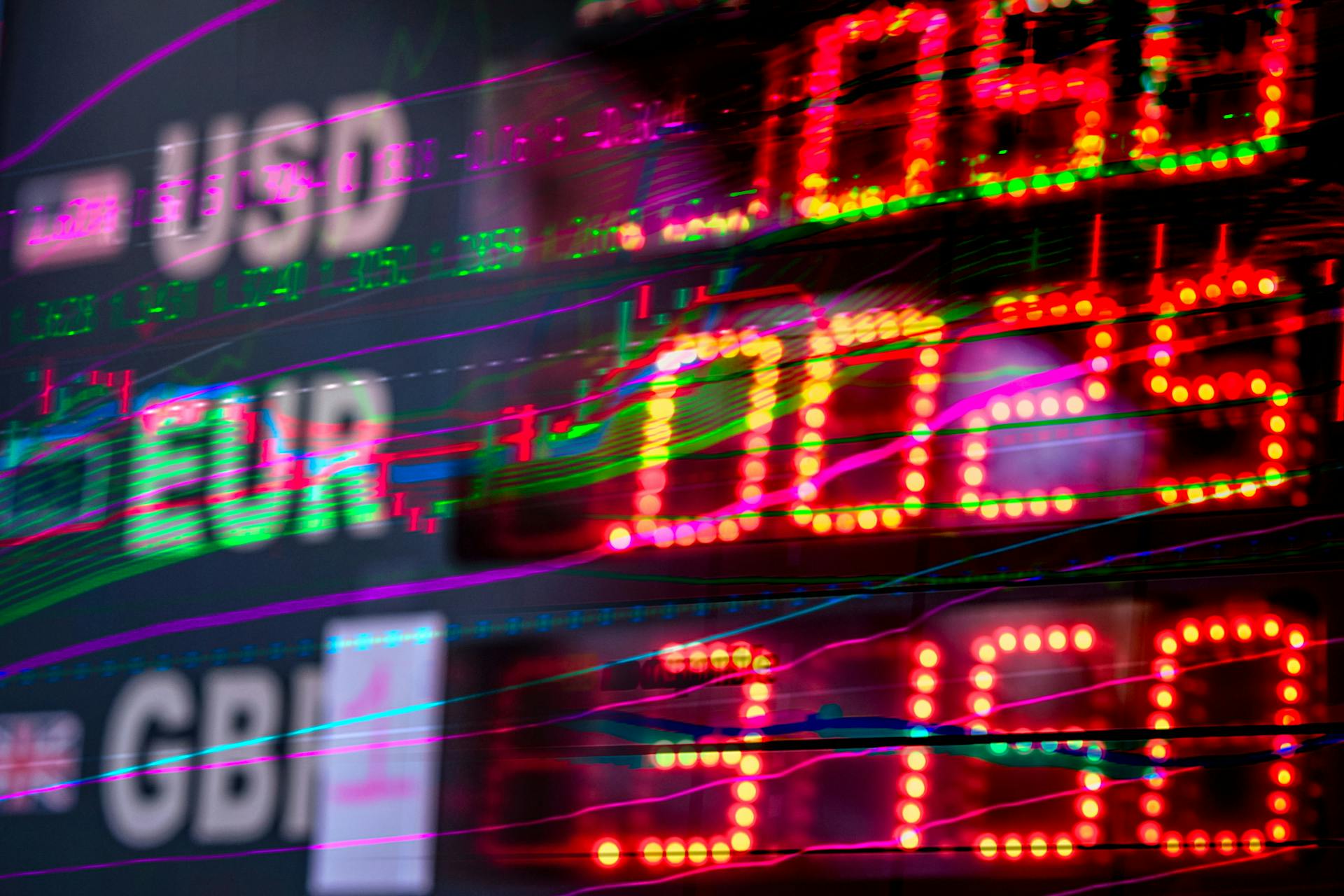
ESG ratings agencies are crucial for investors to make informed decisions about their investments. They assess a company's environmental, social, and governance performance.
These agencies provide a standardized framework for evaluating ESG factors. MSCI ESG, for example, uses a proprietary scoring system to assess companies' ESG performance.
Investors rely on ESG ratings to identify potential risks and opportunities. A study by the Global Impact Investing Network found that 85% of investors consider ESG factors when making investment decisions.
ESG ratings agencies have become increasingly important in recent years, with more investors seeking to incorporate ESG considerations into their portfolios.
What are ESG Ratings Agencies?
ESG ratings agencies collect data on various factors such as greenhouse gas emissions and diversity of company boards to evaluate a company's overall performance.
These agencies use different methods and criteria for company evaluation, which can make it difficult to compare ratings.
ESG rating agencies focus on a company's sustainability and impact on society and the environment, rather than its solvency.
Their ratings are used by investors, analysts, and other stakeholders to assess a company's long-term sustainability and for risk management purposes.
ESG rating agencies collect data on working procedures, engagement with communities, and other factors to provide a comprehensive picture of a company's performance.
MSCI and Other ESG Ratings Agencies
MSCI ESG Ratings provide a comprehensive evaluation of a company's environmental, social, and governance performance, with ratings based on a scale of AAA-CCC and updated every week. MSCI ESG Research looks at 37 key ESG issues, divided into three pillars (environmental, social, and governance) and ten themes.
Bloomberg ESG Ratings evaluate over 10,000 publicly listed companies globally, using 120 indicators for environmental, social, and governance, such as carbon emissions and executive compensation. The rating scale ranges from 0 to 100, with scores from third-party rating agencies.
CDP Scores, formerly known as the Carbon Disclosure Project, is a scoring system that assesses the level of detail and comprehensiveness of a company's response to environmental issues, with scores divided into four levels: Disclosure, Awareness, Management, and Leadership.
What is MSCI?
MSCI is a well-established ratings agency that provides ESG ratings to companies and other entities. They use a rules-based methodology to identify industry leaders and laggards according to their exposure to ESG risks.
Their ESG Ratings range from leader (AAA, AA) to laggard (B, CCC), with average ratings in between. This scale helps investors and stakeholders understand a company's management of ESG risks and opportunities.
MSCI rates a wide range of assets, including equity and fixed income securities, loans, mutual funds, ETFs, and even countries.
MSCI
MSCI is a well-established player in the ESG ratings space. They launched their ESG Research division in 2010 and now provide ESG ratings for over 6,000 global companies and more than 400,000 equity and fixed-income securities.
Their ratings are based on a scale of AAA-CCC and are updated every week. MSCI looks at 37 key ESG issues, divided into three pillars (environmental, social, and governance) and ten themes.
MSCI's ESG Ratings are widely used by institutional investors such as BlackRock, State Street Global Advisors, Allianz Group, BMO Global Asset Management, and others. They are available through subscription-based access to reports and on platforms like FactSet, POINT, StyleResearch, MSCI’s BarraOne, and Barra Portfolio Manager.

The ratings are calculated using a rules-based methodology that identifies industry leaders and laggards according to their exposure to ESG risks and how well they manage those risks relative to peers. MSCI's ESG Ratings range from leader (AAA, AA) to laggard (B, CCC).
Here's a breakdown of MSCI's ESG Rating scale:
- Leader: AAA, AA
- Average: A, BBB, BB
- Laggard: B, CCC
MSCI is also considering integrating ESG factors into their MSCI GIMI (Global Investable Market Indices) methodology, which would reflect ESG research in the indices.
ESG Methodologies and Tools
There are over 2,900 companies that can be explored using MSCI ESG Transparency Tools, which provide data on Implied Temperature Rise, Decarbonization Targets, MSCI ESG Rating, and Key ESG Issues.
Different ESG rating methodologies can tell vastly different stories about the same company, highlighting the need for improvements in the current rating environment.
MSCI ESG Ratings are used in many of MSCI's 1,500 equity and fixed indexes, and are a key factor in selecting policy or performance benchmarks.

The CFA Institute reported in 2021 that companies with high disagreement in their ratings face higher risk premiums but better stock returns.
Here are some ways ESG Methodologies and Tools can be applied:
- Stock analysis
- ESG Ratings used for security selection or within systematic strategies
- ESG Factor in quant model- identify long term trends and arbitrage opportunities
- Adjust discounted cashflow models
These tools can also be used to:
- Identify leaders and laggards to support construction
- Use ratings and underlying scores to inform asset allocation
- Stress testing, and risk and performance attribution analysis
- ESG as a Factor in Global Equity Models
In addition, ESG ratings and underlying scores can be used to make regulatory disclosures, report to clients and stakeholders, and demonstrate ESG transparency and leadership.
FTSE Russell
FTSE Russell is a leading provider of ESG stock indexes, including the FTSE4Good Index, which was launched in 2001 and evaluates companies based on environmental management, social issues, human rights, and governance.
The FTSE4Good Index includes companies that meet sustainability standards and helps investors select investments that align with their values. The index provider, FTSE Russell, removed 34 groups from the FTSE4Good benchmark in 2023 due to their failure to meet the newly introduced Climate Change Score.
FTSE Russell is a trusted name in the ESG industry, and its indexes are used by institutional investors to make informed investment decisions. The FTSE4Good Index is a key benchmark for ESG investors, providing a clear picture of a company's sustainability performance.
In 2023, FTSE Russell introduced a new climate criterion, which requires companies to meet the Climate Change Score in order to remain in the FTSE4Good Index. This marks a significant shift in the industry, as previously companies were only required to meet minimum ESG standards.
How ESG Ratings Agencies Work

ESG ratings agencies collect ESG data from various sources such as sustainability reports, financial statements, media news, articles, and regulatory records.
They may also use third-party data providers and perform their own research to add more data. The framework of rating agencies for company evaluation is based on several ESG factors such as environmental impact, social responsibility, and company governance.
Rating agencies evaluate companies based on their performance within the individual ESG factors, with some agencies using a numerical scale and others alphabetical grades or a relative grading system.
Rating agencies can attribute various importance to each of the ESG factors depending on their significance for the given trade and stakeholders. They can also validate their ratings by methods such as expert opinions, consultations with stakeholders, and benchmarking.
Rating agencies provide their clients with reports where their evaluation, methodology, and analysis are described in detail.
How MSCI Works
MSCI (Morgan Stanley Capital International) ESG Ratings provide a comprehensive evaluation of a company's environmental, social, and governance performance. Launched in 2010, MSCI ESG Research is one of the largest independent providers of ESG ratings.

The ratings are based on a scale of AAA-CCC and are updated every week. MSCI ESG Research looks at 37 key ESG issues, divided into three pillars (environmental, social, and governance) and ten themes.
The data is collected from various sources such as government databases, company disclosures, and macro data from academic, government, and NGO databases. Companies are systematically monitored and reviewed, and new information is reflected in updates in reports weekly.
In-depth company reviews occur at least annually. Companies are also invited to participate in a formal data verification process before the publication of their ESG Ratings report.
MSCI ESG Ratings are widely used by institutional investors such as BlackRock, State Street Global Advisors, Allianz Group, BMO Global Asset Management, and others. The ratings are available through subscription-based access to reports and on platforms like FactSet, POINT, StyleResearch, MSCI’s BarraOne, and Barra Portfolio Manager.
MSCI is currently consulting on whether ESG factors should be reflected in the MSCI GIMI (Global Investable Market Indices), which would likely mean that MSCI’s ESG research would be integrated into the MSCI GIMI methodology.
Research Experience and Leadership

We have a wealth of experience in measuring and modeling ESG performance of companies, with over 40 years of research under our belt.
Our ESG research has earned us a reputation as a 'Gold Standard data provider', and we've been voted 'Best Firm for SRI research' and ‘Best Firm for Corporate Governance research' for the last four years.
We were pioneers in assessing companies based on industry materiality, starting way back in 1999. This approach has proven to be economically relevant, with a 13+ year history of live data.
Our ESG ratings are based on objective rules, with 45% of our data coming from alternative sources, including AI technology that extracts and verifies unstructured data.
We were the first ESG ratings provider to measure and embed companies' ESG risk exposure.
Jak Vám Můžeme Pomoci?
We can help you navigate the complex world of ESG ratings agencies. Our team will guide you through the selection process to find the most suitable agency for your business and real estate portfolio.

We'll organize an initial workshop and prepare a report that presents the relevant rating agencies, their pros and cons, and recommends a partner to contact next. This sets the stage for a successful partnership.
Our guidance through the rating process ensures the best possible outcome. We'll coordinate communication with the rating agency and help you fill out the necessary documents.
We'll also propose measures to improve your rating and position within the peer group rating. This includes developing a roadmap to improve your evaluation and position over time.
Here are some of the specific outputs you can expect from our support:
- Measures to improve future rating
- Roadmap to improve the evaluation and the position within the peer group rating
Frequently Asked Questions
What is the best ESG rating agency?
There is no single "best" ESG rating agency, as each has its own methodology and strengths. To determine the most suitable agency for your needs, consider the specific ESG metrics and criteria that matter most to your organization or investment strategy.
How many ESG rating agencies are there?
There are approximately 125-600 ESG rating agencies globally, with varying estimates depending on the source. The exact number is still unclear, but it's evident that the industry is rapidly growing with numerous providers.
Sources
- https://www.msci.com/sustainable-investing/esg-ratings
- https://www.iriscarbon.com/a-beginners-guide-to-esg-rating-agencies-and-methodologies/
- https://www.cfainstitute.org/insights/articles/the-role-and-rise-of-esg-ratings
- https://www.pwc.com/cz/en/sluzby/sustainability/esg-rating.html
- https://sustainability-news.net/sustainability/the-top-6-esg-ratings-providers/
Featured Images: pexels.com


